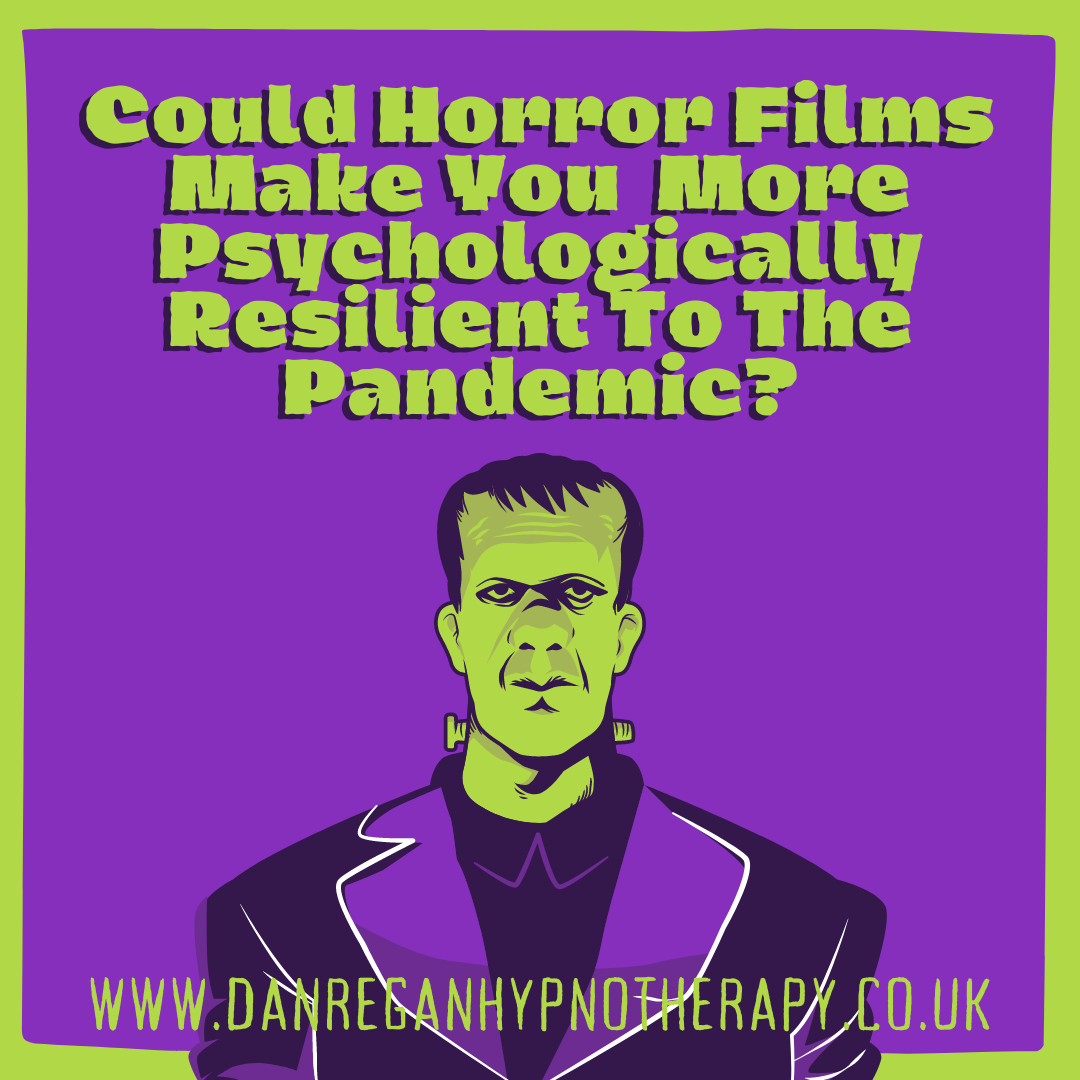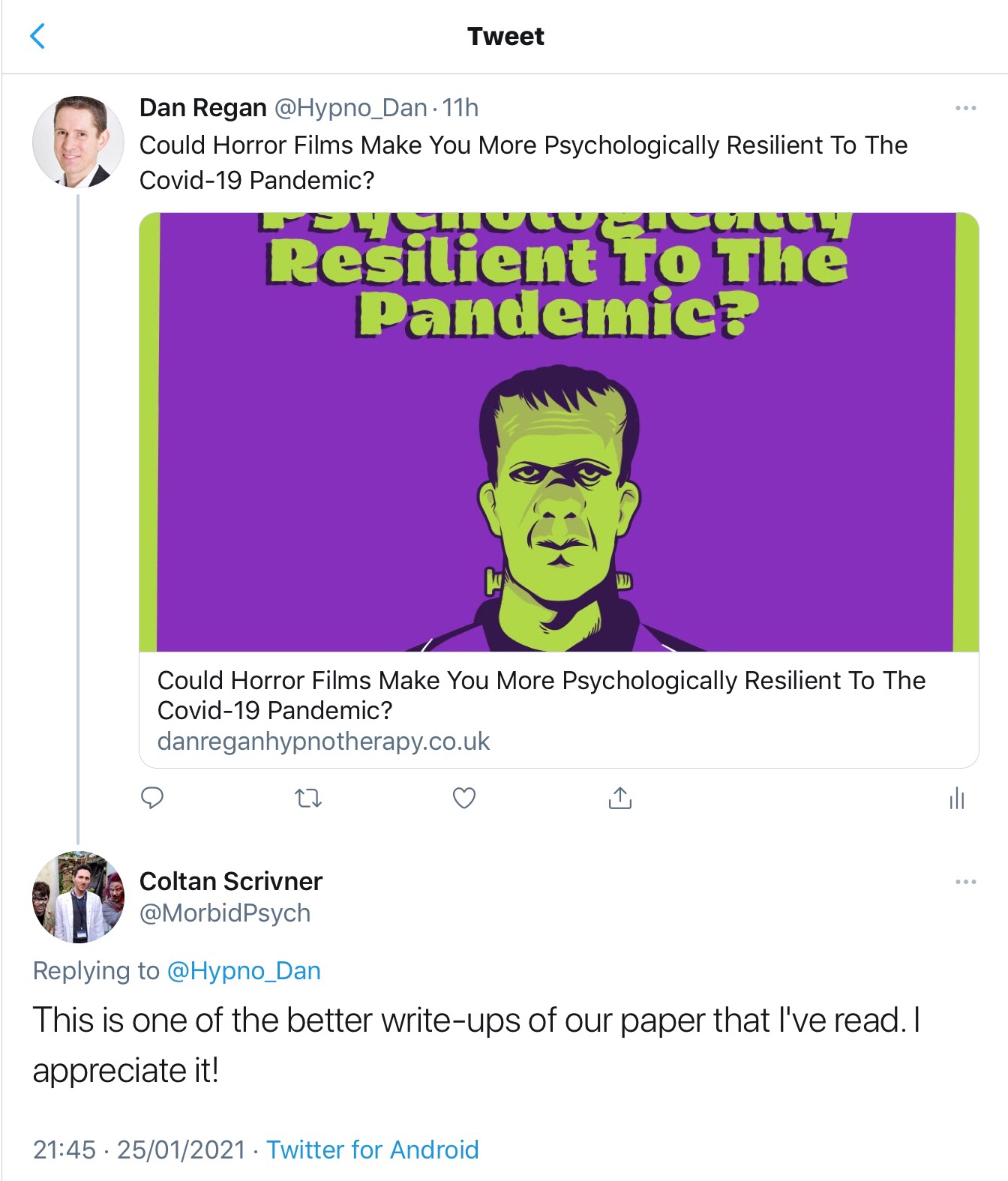
Could Horror Films Make You More Psychologically Resilient To The Covid-19 Pandemic?
Out of all the research into the mental health impact of the Covid-19 pandemic, there comes something a little bit quirkier this time. Could horror films help you to be more psychologically resilient to the pandemic? And before any temptation to treat this as being something perhaps a little frivolous about something serious, do have a read about what the research says and how it links to psychological resilience and being able to deal with the mental health challenges of the pandemic.
Watching horror films is all about be becoming scared or fearful for your own entertainment. Although I have less opportunity to watch them now (due to the kids), over the years I’ve seen many horror films, some much better than others. I can remember way back as a teenager how me and my friends couldn’t wait to watch Nightmare on Elm Street, almost in the hope of being scared witless! And films such as Saw are both horrific, tense, scary and clever in equal measure. Alongside these you can get more comedic films like Shaun of the Dead and the like.
Watching horror films and those that portray other frightening, threatening or dangerous situations (such as zombie films, apocalyptic or alien invasion movies) involves intentionally exposing yourself to, and engaging in, fearful simulated situations and experiences. So can watching these sorts of films bring you psychological benefits and increased resilience when faced with real world threatening experiences, such as the current Covid-19 pandemic?
Psychological Resilience
Resilience is all about your ability to handle life’s challenges and to recover quickly from the difficulties you face. As well as handling, dealing with and coping with things that come your way, it can involve adapting to circumstances, maintaining your mental health and sense of well-being, managing any emotions or psychological distress and being able to bounce-back afterwards.
There’s little doubt that the current Covid-19 pandemic has required us all to demonstrate resilience in our actions and thinking as we deal with everything that has been, and continues, to go on.
It’s also evident that many people have suffered psychological distress, such as fear, anxiety and stress, during the pandemic.
Many people, especially if you are struggling with mental health issues, such as anxiety, depression or stress, tend to doubt their ability to handle, deal and cope with challenges, whether pandemic related or otherwise. Anxiety, for example, involves imagining and anticipating the worst happening and a sense that you won’t be able to handle it or cope.
Yet, in actual fact, we can all be inaccurate when we estimate our own resilience and ability to handle challenges and set backs that may occur. We tend to inaccurately predict how we will respond to emotional events that we face.
Logically we know this is often the case, but it doesn’t necessarily feel like it’s the case. With anxiety, you may know that the worst case is unlikely to happen yet you still feel anxious and dread things. Even afterwards, when you have dealt with it (or at least you got through it somehow), our brains don’t necessarily learn from it and the next time you face a similar thing the anxiety is there overestimating how much distress you will experience again.
As I’ve covered before (in this article: Are You More Resilient Than You Think? Dealing With Challenges Post Covid-19), this overestimation of psychological distress and doubt of your own resilience is true for relationship break-ups, career difficulties, distressing news, personal rejections and for many other areas of life. We tend to persistently and erroneously predict that the emotional impact of an event will be greater than is actually the case. That is, you are more resilient than you think you are.
All of which now brings us back to research about whether fans of horror films have been more psychologically resilient during the Covid-19 pandemic.
Horror Fans and Resilience During Covid-19
Scrivner et al (Pandemic practice: Horror fans and morbidly curious individuals are more psychologically resilient during the COVID-19 pandemic. 2020) tested whether past and current engagement with horror and pandemic films (which are thematically relevant to the current challenges of the pandemic), was associated with greater preparedness for and psychological resilience toward the pandemic.
They found that fans of horror films exhibited greater resilience during the pandemic and that fans of genres where the imagined world is illustrative of the chaos that might occur in a real-world pandemic (zombie, apocalyptic/post-apocalyptic, and alien-invasion) exhibited both greater resilience and preparedness.
“These results are consistent with the hypothesis that exposure to frightening fictions allow audiences to practice effective coping strategies that can be beneficial in real-world situations.”
Thus, being a fan of horror films can have real-life psychological benefits when it comes to experiencing reduced distress during the pandemic.
And as the authors note, whilst most people watch a scary movie with the intention of being entertained rather than learning something, scary stories present ample learning opportunities. By engaging in horror and pandemic type films, it’s possible that these can act as simulations of analogous experiences and that you are gathering information and learning coping strategies.
Of course, on the flip side, some people may find watching horror or pandemic films increases their anxiety and psychological distress. Some people may avoid them for this reason, meaning they do not have the opportunity to safely deal with feelings of fear that can help with coping or in other, real-life, situations and experiences (akin to the avoidance of situations that comes with anxiety).
In addition to these simulations that help you to learn how to navigate situations, there is also scope to learn how to manage and regulate your emotions. Watching horror type films can help you to learn how to effectively and safely manage your fearful emotions, which is a skill that can then be applied when coping with real world events and situations, and which can contribute to less distress and increased resilience.
“While the COVID-19 pandemic has affected nearly everyone in one way or another, certain people seem to be handling the psychological effects better than others. We tested the idea that experience with particular kinds of fiction, namely, horror and pandemic fiction, would be associated with better preparedness for and psychological resilience during the COVID-19 pandemic. Our findings support the idea that fiction can be a useful simulation of both specific scenarios – in the case of pandemic films – and generally fearful scenarios – in the case of horror films.”
And so, it seems that being a fan of horror type movies can help you to develop your ability to manage fearful emotions and feelings and that these fictional simulated experiences can help you to be more prepared and resilient for real life events, such as the Covid-19 pandemic.
Increasing Resilience: Reducing Anxiety and Distress
In many ways, the research about horror films and psychological resilience doesn’t seem that surprising. When you watch a movie, you engage your thinking and imagination into it. You can become absorbed in it and experience a whole range of emotions and feelings.
In the case of scary movies, you can experience fearful and anxious feelings in a safe and voluntary way. You can learn to manage and regulate those emotions, rather than avoid them. And you can, through these virtual simulations, learn information, strategies and ways of thinking that can benefit you in your life.
It all links quite closely to aspects of anxiety. With anxiety, your imagination can lead you into mentally engaging in many worst case and dreaded scenarios. However, that anxiety may lead you to think you can’t or won’t cope and so the strategies and knowledge of how to cope aren’t gained. You may try not to think about those things that cause you anxiety and so ways of regulating those emotions aren’t learnt. And you may avoid certain people, places and situations that make you feel anxious, meaning that emotional coping strategies and ways to regulate those unpleasant emotions aren’t gained.
I’ve written before about anxiety and avoidance and how it perpetuates experiencing anxiety and how it exacerbates anxiety here: Anxiety and Avoidance. The problem with avoidance or escape because of anxiety is that it brings you relief when you do it. You dodge or get away from your anxious thoughts and feelings and then feel better as a result. But that short term relief only re-enforces your anxiety and makes feeling anxious and avoidance all the more likely the next time. In the case of horror films, you deliberately and voluntarily engage in those movies and, in watching, you can learn emotional coping strategies.
So rather than allowing your anxiety to conjure up worst case scenarios, and avoiding situations, it is possible to psychologically prepare to be able to handle and deal with things. Much like with the research above, you can deliberately prepare yourself to cope with things in a calmer and more resilient way. You can develop coping strategies and learn how to manage your emotions effectively.
Develop Your Resilience
So here we are looking to develop your sense of resilience, ability to cope, and ability to reduce unpleasant feelings of anxiety about a particular situation or event. You are learning how to handle, deal and cope with it more effectively. You will be able to manage your thoughts, feelings and behaviours in a way that means you feel more calm, relaxed, comfortable and in control.
Firstly have a think of a specific situation, or the type of situations, where you feel uncomfortable and anxious and where you would benefit from feeling less distress and experiencing more of a sense of resilience. Have a brief think of the kind of feelings, emotions, behaviours, actions and thoughts that you tend to have when in that situation. And maybe already you can start to look forward, and think how much better you will feel, when you are more able to go into and through that situation feeling calm, relaxed, comfortable and in control.
Now, take a few minutes to just relax. If you know self-hypnosis, meditation or mindfulness skills you could incorporate these. Or just sit or lie quietly for a few minutes. You can extend your out breath and say the word ‘relax’ on every breath out. You could tense and relax each part of your body or tell yourself that each part of your body is relaxing. You could imagine a calm colour or sensation spreading through you or still your mind with a relaxing sound. You could engage your imagination and imagine being in a remembered or created place of calmness, seeing the sights and hearing the sounds. Or you can draw upon and utilise any other ways that allow you to feel calm and relaxed.
Having done that, and feeling nicely calm and relaxed, begin to imagine being in that situation. Be there in your mind, seeing things through your own eyes, the colours, shades of light and details of the place. And hearing the sounds that are happening here in this situation, keep all the feelings of relaxation with you and really imagine being in this situation, seeing through your own eyes, as if it’s happening now. Go through it in your mind, mentally rehearsing feeling calm, relaxed, comfortable and in control about every aspect of this situation. Run through the entire situation while feeling calm, relaxed, comfortable and at ease.
Then, continuing to relax and feel comfortable, and continuing to imagine being in the same situation, run through it now having the behaviours and taking the actions of someone who is now calm, relaxed, comfortable and in control. Imagine yourself behaving in a calm and comfortable way, handling and coping with whatever comes your way. Mentally rehearse being there, going through this situation and being calm, relaxed, comfortable and in control in your actions and reactions, handling things in a way that pleases you.
Now, as you continue to relax, imagine being in this situation and thinking to yourself how you are now calm, relaxed, comfortable and in control. Say it to yourself inside your mind, “I now feel calm, relaxed, comfortable and in control.” Continue to repeat it to yourself with a sense of belief and conviction, like you just know it to be the case. Go through the entire situation thinking this positive thought to yourself, with undeniable conviction, making it your reality.
Run through and mentally rehearse the entire situation, feeling calm, relaxed, comfortable and in control of your feelings, your behaviours and of the thoughts in your mind. Run it through in your mind until after you’ve gone successfully through it, coming out the other side of it feeling pleased because you handled it so well.
You can repeat these steps if you want to before taking a moment to reorient yourself to the present moment and to get on with your day, having a sense of resilience that comes from knowing that you can handle, deal and cope with this situation, being able to manage your thoughts, feelings and behaviours, and that you can and will go through it successfully.
And, of course, if you did want to (although now you don’t need to), you could combine this with watching horror movies or pandemic films to get the psychological benefits and boost to your resilience that the research suggests will comes from them (or just make use of the steps above and perhaps my hypnosis downloads too, to develop your psychological resilience).
To your health and happiness,
Dan Regan
Online Skype and Zoom Hypnotherapy
Face-to-face hypnotherapy in Ely & Newmarket
Postscript:
I was very pleased to receive this Twitter feedback from Scrivner about my coverage of his paper in this article:
Need some help with anxiety, stress, worry and fear? Book your Complimentary Hypnotherapy Strategy Session with Dan now: Appointments
Find out what other people have said after their hypnotherapy sessions with Dan: Hypnotherapy Testimonials
And check out these powerful hypnosis downloads that can start helping you right away with anxiety, confidence and more: Hypnosis Downloads
Reference: Scrivner, C., Johnson, J.A., Kjeldgaard-Christiansen, J. and Clasen, M., 2020. Pandemic practice: Horror fans and morbidly curious individuals are more psychologically resilient during the COVID-19 pandemic. Personality and individual differences, 168, p.110397.





0 Comments